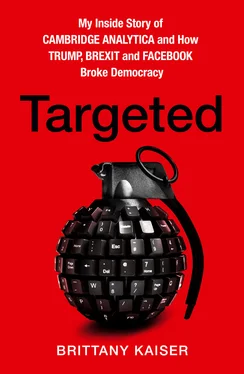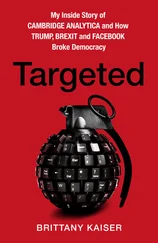I peered through the window at the man. I saw him now as someone more than average. With his phone still to his ear, he suddenly looked terribly serious and consummately professional. Clearly, I was outclassed and outdone. I was disappointed, but I tried hard not to let it show.
“I thought you might like to meet him,” Chester offered. “You know,” he went on, “he’s a good connection and all that,” meaning, perhaps, future paying work. “Or,” Chester suggested, alternatively, “at least interesting fodder for your dissertation.”
I nodded. He was probably right. As disappointed as I might be about what I presumed was already a lost business opportunity, I was academically curious. What did the CEO of such a company actually do? I’d never heard of an elections company.
From my time with Obama and from my recent volunteer work in London with the Democratic Party expat organization Democrats Abroad and with the super PAC Ready for Hillary, my own experience was that campaign managers ran campaigns, working in their own country with, of course, the support of a small but elite group of highly paid experts and an army of underpaid staff, volunteers, and unpaid interns, as I had been. After the 2008 Obama campaign, I’d certainly come across a few people who later became professional campaign consultants, such as David Axelrod, who had been chief strategist for Obama and had gone on to advise the British Labour Party; and Jim Messina, once called “the most powerful person in Washington that you haven’t heard of,” 1who had helmed Obama’s 2012 campaign, had become Obama’s White House chief of staff, and would go on to advise foreign leaders ranging from David Cameron to Theresa May. Still, it had never occurred to me that there existed entire companies dedicated to the goal of getting people elected to political office abroad.
I regarded the figure through the restaurant’s plate glass window with equal parts curiosity and puzzlement. Chester was right. I might not get any work at the moment, but maybe I would in the future. And I certainly could use the afternoon as research.
The restaurant was pleasant enough,brightly lit from above, with pale wooden floors and cream-colored walls along which Japanese artwork had been tidily hung. Approaching the table, I surveyed the man whom I had been watching from outside. He’d finished his phone call, and Chester made the introductions.
At closer range now, I could see that Nix wasn’t your typical Mayfair business type after all. He was what the British call “posh.” Immaculate and traditional, he was dressed in a dark, bespoke navy suit and a woven silk tie knotted at the neck of a starched button-down—pure Savile Row, right down to his shoes, which had been shined to a blinding polish. He had beside him a well-worn-in leather briefcase with an old-fashioned brass lock; it looked like it could have been his grandfather’s. Though I was a full-blooded American, I had lived in the United Kingdom ever since I graduated from high school, and I knew a member of the British upper crust when I saw one.
Alexander Nix, though, was what I’d call upper-upper crust. He was handsome in a British boarding school sort of way—Eton, as it turned out—and he was trim, with a sharp, arrow-like chin and the slightly bony build of someone who doesn’t spend any time at the gym. His eyes were a striking, opaque bright blue, and his complexion was smooth and unwrinkled, as though he’d never known a moment of worry in his life. In other words, it was the face of utter privilege. And as he stood before me in that West End London restaurant, I could easily have imagined him helmeted astride a galloping polo pony with a custom-made wooden mallet in hand.
I tried to guess his age. If he were as successful as Chester had claimed, he was likely older than I was by at least a decade, and his posture, equal parts upright and confident, yet somehow also relaxed, suggested an early middle-aged life, one that was aristocratic with a pinch of meritocracy thrown in. He looked as though he’d come into the world with a pretty good leg up, but that he’d used those legs, if Chester was right, in order to stand on his own two feet.
Nix greeted me warmly, as if I were an old friend, shaking my hand with vigor. As we took our seats at a large table tucked away from most of the others in the restaurant, he quickly, though not impolitely, turned his attention to Chester’s other two friends and effortlessly picked up the thread of what must have been the conversation they were having before I arrived.
With little revving up, Nix entered full-pitch mode. I recognized what that was because I knew how to do it myself. In order to support myself through all my studies, I’d taught myself how to pitch clients for consulting work, although I could see how skilled Nix was at it. I had neither half his charm nor his experience, and I certainly didn’t have his polish. His delivery was as bright as the shine on his expensive shoes.
I listened as he laid out the long history of the company for which he worked. The SCL Group had been established in 1993. Since then, it had run more than two hundred elections and had carried out defense, political, and humanitarian projects in some fifty countries worldwide; when Nix listed them, it sounded like the roster of countries on a United Nations subcommittee: Afghanistan, Colombia, India, Indonesia, Kenya, Latvia, Libya, Nigeria, Pakistan, the Philippines, Trinidad and Tobago, and more. Nix himself had been with SCL for eleven years at that point.
The sheer accumulation of experience and the volume of his work was astonishing to me, and humbling. I couldn’t help but note that I was six years old the year of SCL’s founding, and in the period of time when I was in kindergarten, grade school, and high school, Nix had been part of building a small but powerful empire. While next to those of my peers, my résumé looked pretty good—I’d done a great deal of international work while living abroad and since my time interning on the Obama campaign—but I couldn’t compete with Nix.
“So, we’re in America now,” Nix was saying, with barely contained enthusiasm.
Just recently, SCL had established a nascent presence there, and Nix’s short-term aim was to run as many of the upcoming American midterms in November 2014 as he could, and then go on and corner the elections business in the United States as a whole, including a presidential campaign if he could get his hands on it.
It was an audacious thing to say. But he had already secured the midterm campaigns of some notable candidates and causes. He’d signed the likes of a congressman from Arkansas by the name of Tom Cotton, a wunderkind Harvard grad and Iraq War veteran who was running for a seat in the Senate. He’d signed the entire slate of GOP candidates across all the races in the state of North Carolina. And he’d snagged the business of a powerful and deep-pocketed political action committee, or super PAC, belonging to UN ambassador John Bolton, a controversial figure on the right with whom I was all too familiar.
I had lived in the United Kingdom for years, but I knew at least some of the American neoconservative standouts such as Bolton. He was the kind of figure it was hard to ignore: a hawkish lightning rod who, along with a host of other neocons, had recently been revealed to be the brains and cash behind a shadowy organization called Groundswell, the intention of which, among other things, was to undermine the Obama presidency and hype the Hillary Clinton Benghazi controversy, 2the latter issue with which I was personally familiar. I had worked in Libya and had known Ambassador Christopher Stevens, who died there due in part to the poor decision making of the U.S. State Department, I thought.
Читать дальше












